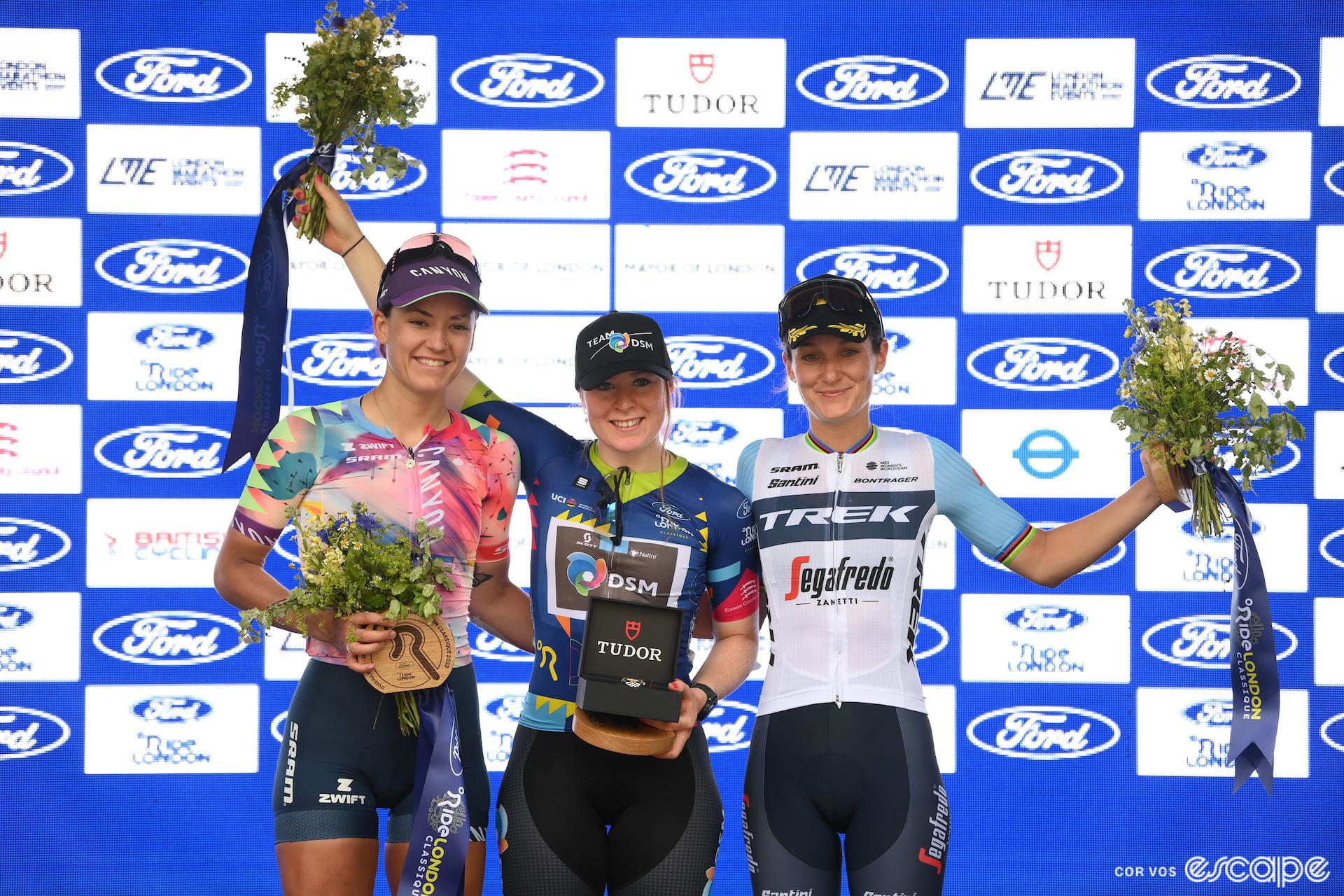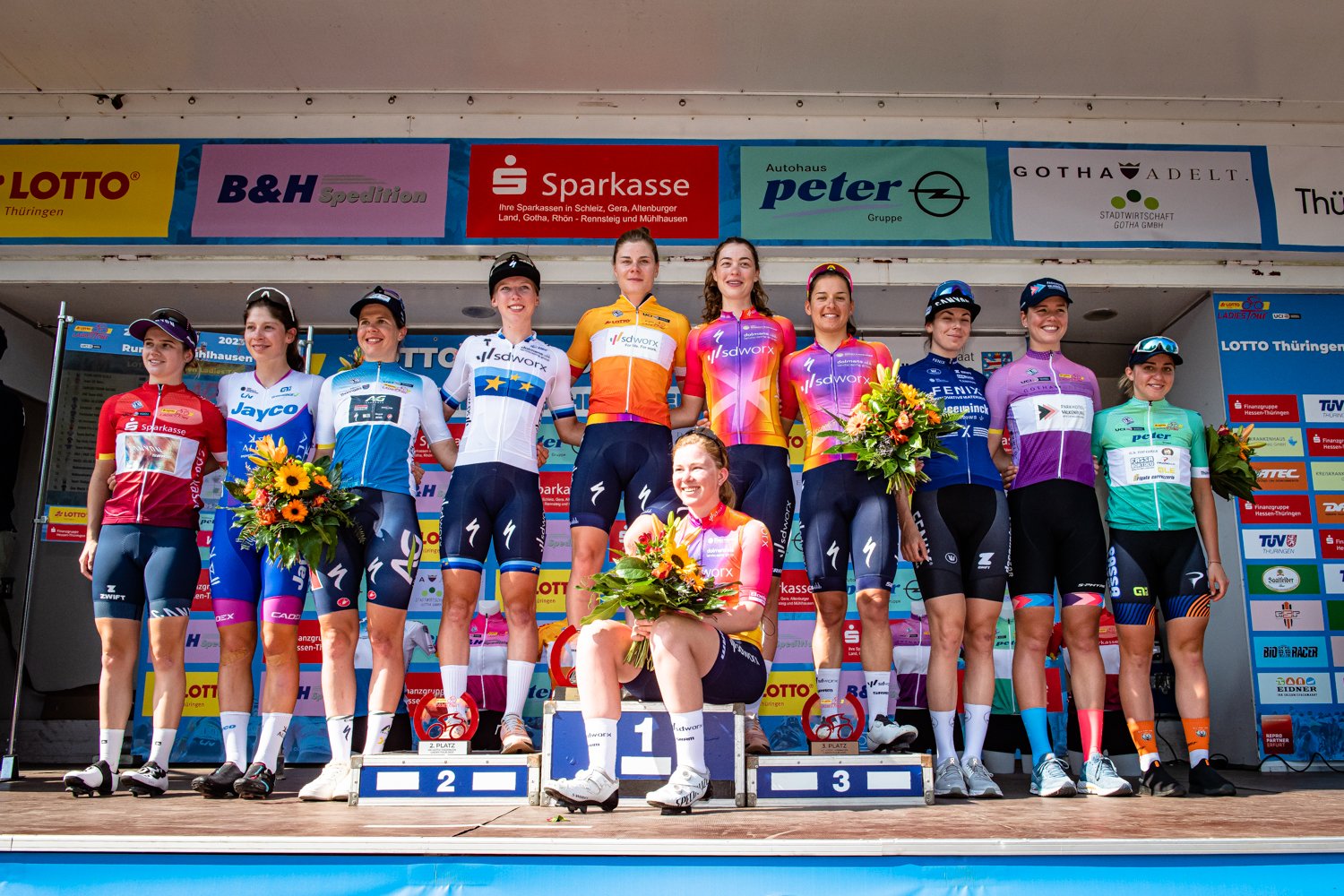It’s become an incredibly familiar sight in 2023: an SD Worx rider, crossing a finish line with arms aloft, often with a teammate doing the same thing behind.
Of the 18 Women’s WorldTour events so far this year, SD Worx has won 10 (and they didn’t send a team to three). They’ve gone 1-2 at no fewer than 12 finish lines this year; 14 if you count final GC standings in stage races. And as of this past weekend, they’ve now won every stage and the overall at three stage races: Itzulia Women, the Vuelta a Burgos, and the Lotto Thüringen Ladies Tour.
It was at Thüringen last week, though, that SD Worx took its dominance to another level entirely.
By the time the final stage ended on Sunday, SD Worx had won all six stages, gone 1-2-3 in the GC, taken out the points classification, and won the teams classification to boot (not surprising when you fill the GC podium).
But wait: there’s more. Not only did SD Worx win every stage of the race; they won each stage with a different rider.
After the team won the stage 1 team time trial, which put Lotte Kopecky into the overall lead, Mischa Bredewold won stage 2 solo, moving into the leader’s jersey (with Barbara Guarischi second on the stage and Lorena Wiebes third for a podium sweep).
On stage 3, Guarischi won the sprint from a small group with Wiebes taking second.
On stage 4, Lonneke Uneken won the sprint from a three-rider breakaway.
On stage 5, Wiebes won a bunch sprint with remarkable ease, taking the overall lead in the process.
And on the final stage, Kopecky won solo, taking back the race lead as Wiebes finished second on the stage (and overall).
SD Worx brought five riders to the Lotto Thüringen Ladies Tour. All five won a stage. The only other stage of the race was won by the five of them together. Complete domination.
At first glance, SD Worx’s participation at Thüringen was a bit of a head-scratcher. The German six-day race is a second-tier (2.Pro) event and it was held at the same time as a top-tier (WorldTour) race: RideLondon Classique. Why wouldn’t SD Worx, the best team in the world, go to the top-tier race? Especially when Wiebes won all three stages and the overall last year, and won the previous edition, when it was a one-day race in 2019?
As Abby Skujina Mickey wrote for Escape Collective last week, the decision might have been a nod to the ‘Grand Tours’ ahead: the Giro d’Italia Donne (June 30 to July 9) and the Tour de France Femmes avec Zwift (July 23-30). Despite being a WorldTour race, RideLondon was only three days long. Thüringen, despite being a second-tier race, was six days long: arguably better preparation for the nine days of the Giro and eight days of the Tour.
Plus, it’s not like SD Worx needed the UCI points – in the battle to avoid WorldTour relegation, SD Worx is beyond safe.
Still, in an ideal world, it would have been nice to see the top-tier team race the top-tier event. Why? One: so we had the best of the best duking it out at the WorldTour event in the UK (the more battles between Wiebes vs Charlotte Kool the better). Two: so that smaller teams actually had a chance of scoring big points in the battle for WorldTour spots, rather than being steamrolled by the Dutch juggernaut.
And three: because, in truth, SD Worx’s presence at Thüringen made the race a whole lot less interesting to watch. At a time when SD Worx’s dominance is getting increasingly tiring for fans – and indeed for riders! – six days of the world’s best smashing smaller teams is probably not what the sport needs.
Still, we shouldn’t begrudge SD Worx for the success they’re having. They were entitled to take part in the event, and the riders certainly shouldn’t be criticised for doing what they’re paid to do: win bike races.
And besides, the SD Worx-sized hole at RideLondon made that particular race even more exciting. We got to see the continued rise of Charlotte Kool as one of the peloton’s premier sprinters – Kool vs Wiebes at the Tour, anyone? – and we got to see Canyon-SRAM finally take that long-awaited WorldTour win, courtesy of the ever-improving and undeniably exciting Chloe Dygert.

SD Worx, meanwhile, is on track to have one of the greatest seasons the sport has ever seen. With 32 wins for the year already, it’s almost a decade since a team was winning as much.
In 2014, the mighty Rabobank-Liv won a total of 47 races, thanks to an outrageously strong line-up that included Lucinda Brand, Pauline Ferrand-Prévot, Kasia Niewiadoma, Iris Slappendel, Anna van der Breggen, Annemiek van Vleuten, and, to top it off, the greatest of all time, Marianne Vos.
Two years earlier, Specialized-Lululemon won 48 races thanks to a stacked squad of its own that included Ina-Yoko Teutenberg, Lisa Brennauer, Chloe Hosking, Ellen van Dijk, Evelyn Stevens, and Amber Neben.
By all accounts, the level in the women’s peloton has improved markedly since the early 2010s, theoretically making it harder to dominate in the way that earlier super-teams were able to. And yet, SD Worx is on track to eclipse both 2012 Specialized-Lululemon and 2014 Rabobank-Liv. It’s been a truly remarkable start to the year.
Hopefully, though, the stage races ahead – the Giro and Tour especially – will offer a bit more variety when it comes to the winners’ list. Hopefully teams like Trek-Segafredo, Canyon-SRAM, and Movistar can take the battle to the Dutch giants in a way they haven’t done with any real consistency so far this season. Hopefully we get the Demi Vollering vs Annemiek van Vleuten rematch we’ve all been waiting for at the Tour de France.
In the meantime, let’s all sit back and marvel at the exploits of an incredibly strong team at the height of its world-beating powers.
Did we do a good job with this story?

